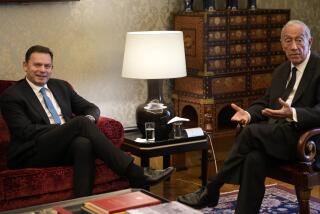Greece to hold early elections in challenge to EU austerity plan
Greece’s prime minister called Monday for early parliamentary elections, marking a major setback for his austerity government and a potential rejection of the tough fiscal prescription imposed by the European Union and International Monetary Fund.
The election, 18 months earlier than expected, comes as Greece’s economy has shown some signs of recovery, emerging from six years of depression that have cost the country about 24% of its national output and tripled the rate of unemployment.
------------
FOR THE RECORD
An earlier version of this post said the Greek stock market had gone down by 6%. The correct figure is nearly 4%.
------------
Prime Minister Antonis Samaras announced his plan to hold parliamentary elections on Jan. 25 after the candidate he was supporting failed to win election as president.
After three rounds of voting, Stavros Dimas, the lone presidential candidate in the heated month-long race, emerged with 168 votes, far short of the 180 supermajority he needed from Greece’s 300-member parliament. He was seeking to succeed outgoing President Karolos Papoulias.
The rejection marked a major setback for Samaras. But it also signaled strong opposition to the strict fiscal discipline that Eurozone countries, led by Germany, have prescribed for Greece in exchange for a $293 billion lifeline that has kept its economy afloat since 2010.
“This is the hour, now, of the Greek people,” a stern-faced and visibly distraught Samaras said in a televised statement after the failed voted. “What Parliament did not do, today, they will [through the elections]: rid the country of uncertainty.”
Although opinion polls show more than 50% of Greeks opposing early elections, support for continued austerity has waned, giving way to calls from opposition leader Alexis Tsipras to end the brutal budget cuts.
A former volleyball player who plunged into politics after suffering a serious knee injury, Tsipras gained prominence in the 1990s leading student protests for the communist youth party. More recently as leader of the leftist Syriza party, he promised to tear up the country’s loathed loan agreement, a vow that appealed to many crisis-crippled Greeks.
Exploiting public anger against the austerity measures imposed by the EU and IMF, his political fortunes soared in May’s European elections when his party won 26% of the popular vote, 3 percentage points more than Samaras’ conservative New Democracy party.
Polls now consistently rank Syriza as Greece’s most popular party, although Tsipras is no longer pledging to rip up Greece’s bailout agreement. Still, investors remain suspicious of his new $14 billion stimulus plan, which includes restoring minimum wages and Christmas bonuses, creating 300,000 new jobs and offering free electricity to hundreds of thousands of poverty-stricken Greeks.
Two months ago, and in another bid to rally market support, a team of Syriza economists went to London to meet with global fund houses and banks, but failed to gain their support.
A leaked memo from Joerg Sponer, an analyst at Capital Group, the ninth-largest fund house worldwide, described the Syriza plan as “worse than communism” and “total chaos.”
On Monday, news of the failed presidential vote sent the Athens stock market down by nearly 4%. Stock markets in debt-laden Italy and Spain also fell, fanning fears about the future of Greece’s international bailout.
Market analysts fear that European lenders could pull the plug on further aid to Greece, leaving local banks reliant on more expensive funding from their own central bank.
Insisting he is pro-European, Tsipras wants to reform rather than break up the European Union, and wants to renegotiate Greece’s debt.
“This is a historic day,” Tsipras said after the vote. “The Samaras government, which pillaged Greek society with brutal measures, is history. So too are all of the the austerity plans.”
“The future for Greece begins now,” he added.
Carassava is a special correspondent.
More to Read
Start your day right
Sign up for Essential California for news, features and recommendations from the L.A. Times and beyond in your inbox six days a week.
You may occasionally receive promotional content from the Los Angeles Times.






